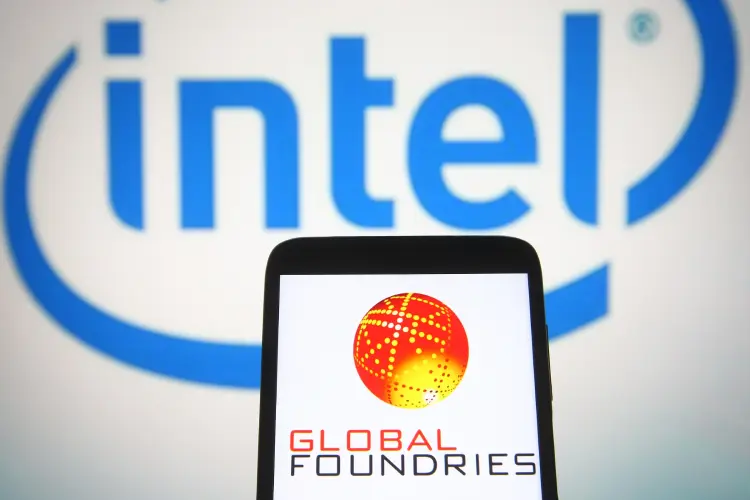
Intel is said to be in discussions with rival chipmaker GlobalFoundries about a $30bn takeover. If it comes to fruition the deal would bolster Intel’s manufacturing capabilities as it pursues a new strategy of producing semiconductors for third parties.
The rumoured takeover, first reported by the Wall Street Journal, would be Intel’s largest-ever acquisition. Talks are said to be at an early stage, and GlobalFoundries owner, Mubadala Investment, may instead decide to proceed with a planned IPO to raise funds.

Intel is said to be in talks over a $30bn takeover of rival chip manufacturer GlobalFoundries. (Photo by Viewimage/Shutterstock)For Intel and its new CEO Pat Gelsinger, buying GlobalFoundries would fill a gap in the company’s capabilities, specifically when it comes to building chips on mature process nodes, experts told Tech Monitor.
Intel GlobalFoundries takeover: why it makes sense
GlobalFoundries was formed in 2009 when AMD, another US chip firm, decided to spin-off its manufacturing business. Taking over the company would give Intel control of six additional chip factories, or fabs, in the US, Germany and Singapore.
While getting hold of additional capacity would boost Intel at a time when semiconductors are in high demand owing to the global chip shortage, it is the type of products they manufacture which is perhaps more crucial. “GlobalFoundries has a lot of process tech that Intel doesn’t have,” says Alan Priestley, vice president analyst at Gartner. “The scope of Intel’s manufacturing capacity is constrained to high-performance logic, which is great for developing microchips, but in terms of a broader foundry business Intel doesn’t have the process tech available to TSMC, Samsung or GlobalFoundries.”
Most of the demand in the semiconductor market is for more mature process nodes, older chips typically used in industries such as automotive, rather than the cutting-edge designs which power the latest computers, servers and mobile devices. Mike Orme, who covers the semiconductor market for GlobalData says GlobalFoundries fabs “are not state of the art”, explaining “they produce 14nm and lower level”. But, he says, “more than 80% of the demand for chips is for 14nm and less advanced chips right out to 200nm and beyond”. Figures from Counterpoint Research show that GlobalFoundries has a 7% share of the “matured nodes” semiconductor manufacturing market, where Intel is nowhere to be seen and Taiwanese companies dominate.
Gaining this group of customers would hand Intel an immediate boost, Orme says. "Intel would be getting what it trusts to be a 'sticky' new customer base," he adds.
Building the new Intel
As reported by Tech Monitor, Intel has been pursuing a new manufacturing strategy since Gelsinger took over as CEO earlier this year. Rather than just making chips for its own use, it plans to become a foundry business supplying third parties to help it compete with market leader TSMC. Known as IDM 2.0, Gelsinger described the new approach as the "kind of elegant strategy only Intel can deliver".
In practice, this means Intel's foundries are likely to make chips based on the rival Arm architecture, as well as its own x86 designs, Orme says. He explains the company is aiming to create a chip eco-system suitable for the next generation of semiconductors. "The new Intel that Gelsinger is gestating will have the industry's broadest product portfolio, world-class foundry capacity and the flexibility required as the rule of monolithic, motherboard based chips ends and hybrid customer-merchant market supplier silicon infrastructures evolve for AI, IoT and edge systems," Orme says.
Any move for GlobalFoundries is likely to be welcomed by the US government, which has identified semiconductors as a priority for US president Joe Biden's plan to strengthen American manufacturing. "Intel is now a key US government strategic asset in Washington's bid to source domestic demand [for chips] from US companies," says Orme. "So as the 'national champion' it is likely Intel would get plenty of subsidies to help it make a GlobalFoundries acquisition, as well as to revamp its Arizona plant. A move [for GlobalFoundries] would fit Intel's game plan exceedingly well."
So far neither company has commented on the potential takeover, but more details may come to light when Gelsinger hosts an online event, Intel Accelerated, on Monday 26 July, which will focus on the company's manufacturing plans.






